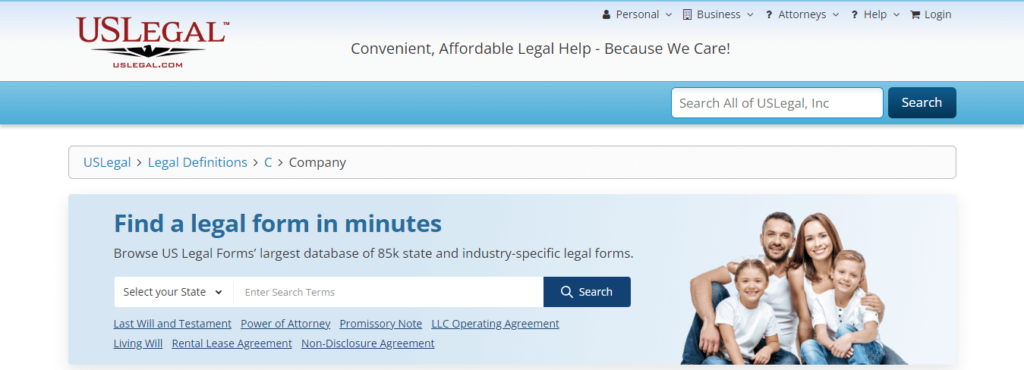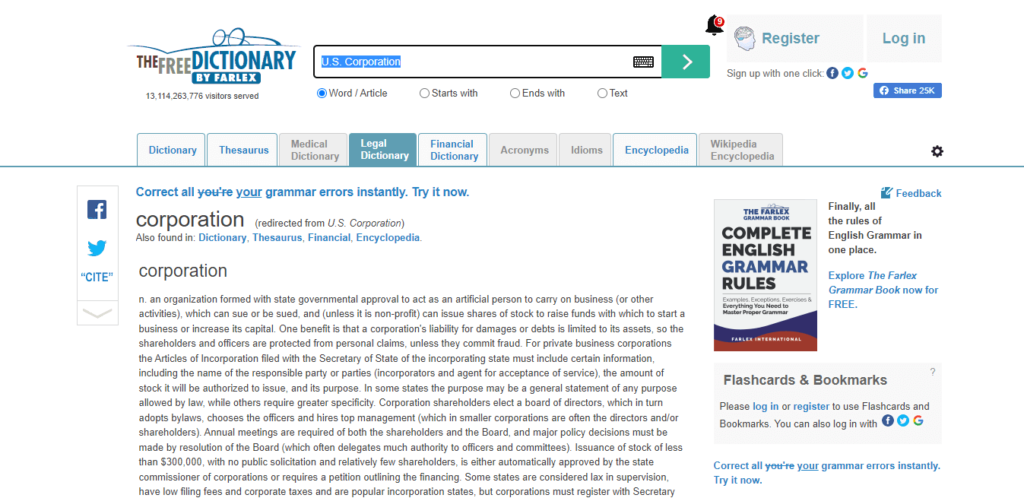In the business world, both corporation and company are very commonly used words. Many people think that corporations and companies are the same things. But that’s not right. There are significant differences between a corporation and a company. One of the key differences between a corporation and a company is the size. Company is a type of business and best uses for small businesses and entities. On the other hand, a corporation is a form of business best used for large businesses and entities.
Key Takeaways
- A company is a legal artificial person because it has its own name and bank account
- A company is a separate legal entity and it’s not responsible for its workers
- A company can be classified based on liabilities, members, control, etc.
- A corporation can be created by individuals, stockholders, or shareholders and like a company it is also a legal entity
- Double taxation is a key feature of a corporation
- Corporations are available in 7 types where S Corporation and C Corporation are the two most popular types
What Is A Company?
A company is a type of legal entity or business entity that offers goods or services to customers and it is formed by an individual or a group of people. The main goal of a company is to earn profit and it can be a commercial or an industrial enterprise. According to the US legal definition, the definition of a company is –

“A company can be a corporation, partnership, association, joint-stock company, trust fund, or organized group of persons, whether incorporated or not, and (in official capacity) any receiver, trustee in bankruptcy, or similar official, or liquidating agent, for any of the foregoing.”
There are many ways you can create a company. But you have to remember that each type of company has its own advantages and disadvantages depending on the business operations and tax purposes.
Important Features Of A Company
1. A company has some key features and characteristics. They are –
2. According to the law, a company is a legal artificial person because it has its own name and bank account
3. A company can own property under its name, file a lawsuit against a person or another company, or perform other activities that a person can
4. A company is a separate legal entity and it’s not responsible for its workers. For example, if a member of a company doesn’t pay his debt then the company is not responsible for that incident
5. It is required to register a company by the law and under the ordinance of the companies act
6. A company must have a memorandum of association, board of directors, share prices, shareholders, company name, bank account, phone number, address, and other legal documentation
7. A company has limited liability therefore shareholders liability is limited to their share price only
Types Of Companies
Over the years, company forms of businesses have become very popular and it resulting in many new types of companies. You can easily classify the companies based on liabilities, members, control, and many more. Let’s check them out!
Types Of Companies On The Basis Of Liabilities
1. Companies Limited by Shares
2. Companies Limited by Guarantee
3. Unlimited Companies
Types Of Companies On The Basis Of Members
1. One Person Companies (OPC)
2. Private Companies
3. Public Companies
Types Of Companies On The Basis Of Control
1. Holding and Subsidiary Companies
2. Associate Companies
Types Of Companies On The Basis Of Access To Capital
1. Listed Companies
2. Unlisted Companies
Other Types Of Companies
1. Government Companies
2. Foreign Companies
3. Charitable Companies
4. Dormant Companies
5. Nidhi Companies
6. Public Financial Institutions
What Is A Corporation?
A corporation is a legal entity that is created by individuals, stockholders, or shareholders and it is authorized by the state to act as a single entity for certain purposes. The main purpose of a corporation is to make a profit and usually, a corporation is separated from its owners. A corporation can enjoy most of the rights and responsibilities that a person can possess. According to the US legal definition, the definition of a corporation is –

“An organization formed with state governmental approval to act as an artificial person to carry on business (or other activities), which can sue or be sued, and (unless it is non-profit) can issue shares of stock to raise funds with which to start a business or increase its capital. One benefit is that a corporation’s liability for damages or debts is limited to its assets, so the shareholders and officers are protected from personal claims unless they commit fraud.”
A corporation can sell off its ownership in the form of stocks and it’s a great way to raise capital. Moreover, the transferability of ownership is one of the main differences between corporations and companies.
Important Features Of A Corporation
1. For a corporation, it’s very easy to acquire debt and equity; a corporation can sell shares to new investors and increase the capital
2. A corporation issues a dividend to pay its shareholders; it is different from paying the owners of a partnership or sole proprietorship
3. Double taxation is a key feature of a corporation. A corporation pays income tax on its earnings and the shareholders also pay income tax based on the dividend they receive from the corporation
4. A corporation can operate forever, only the shareholder change. Though, the owners can terminate the corporation at any time
5. Corporation has limited liability; any liabilities from a corporation do not transfer to its shareholders
6. Buying and selling of shares is an easy way to transfer the ownership of a corporation
7. A corporation is considered as a separate entity from its owners and it has many of the rights and responsibilities of a person
Types Of Corporations
Most of the people are familiar with S Corporation and C Corporation. But these two are not the only types of corporations. There are few other types of corporations available. The types of corporations are –
S Corporation: An S Corporation is a business entity where the shareholders are responsible for income and loss. Therefore, S corporations can be taxed like a partnership but gain corporate perks.
C Corporation: It is quite like the S corporation but unlike the S corporation, C Corporation can have any number of shareholders from any background. This means C corporation’s owner can be the employee of the corporation also.
Regular Corporation: This type of corporation is owned by stockholders. Then the stockholders elect a Board of Directors to handle the day-to-day operations.
Statutory Close Corporation: This type of corporation can be operated without a Board of Directors and without annual meetings. Though, the law provides “default” positions on many issues.
Quasi-Closed Corporation: This type of corporation can enjoy the freedom of the Statutory Close Corporation without the restrictive “default” positions.
Professional Corporation: A Professional Corporation is a type of professional firm which might not be incorporated; for example accountants, lawyers, etc.
Non-profit Corporation: This type of corporation is formed to continue charitable, education, religious, or other types of activities that are beneficial for the general people.
The Difference Between Corporation And Company
1. The main difference between a corporation and a company is size. A corporation represents a big business where a company represents a small business or entity
2. In a corporation, shareholders are the owner but in a company, members are the owner
3. The corporation is a visible legal entity or business but the company is an invisible legal entity that exists only on a paper
4. The ownership structure of a corporation is big and complex but for a company, the ownership structure is less complex and it’s usually small
5. In a corporation, the management or owners don’t interfere in the daily functions on the other hand in a company owners interfere and run the daily tasks of the business
6. The corporation can only be incorporated but a company can be incorporated or corporate
7. A corporation must have a board of directors where a company has one sole or two equal directors or majority shareholders of the company
8. In a corporation several individual persons are involved in the organization but for a company, it might be one or two persons
9. Corporations have significant stature in the marketplace and economy compared to a company
10. Transparency and disclosure is a focal points for a corporation but it’s less important for a company
11. A corporation is double taxed; once on the corporate earnings and the other once on an owner’s individual earnings but a company is taxed once every year
References:
1. https://askanydifference.com/difference-between-corporation-and-company/
2. https://smallbusiness.chron.com/difference-between-corporation-company-5182.html
Last Updated on October 20, 2022 by Magalie D.

Magalie D. is a Diploma holder in Public Administration & Management from McGill University of Canada. She shares management tips here in MGTBlog when she has nothing to do and gets some free time after working in a multinational company at Toronto.





